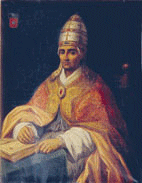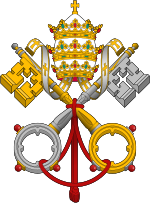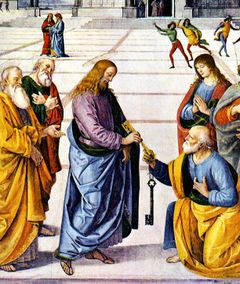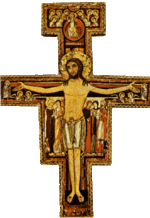Pope Benedict XII
| Benedict XII | |
|---|---|
 |
|
| Papacy began | December 20, 1334 |
| Papacy ended | April 25, 1342 |
| Predecessor | John XXII |
| Successor | Clement VI |
| Personal details | |
| Birth name | Jacques Fournier |
| Born | ca. 1280s Saverdun, France |
| Died | April 25, 1342 Avignon, France |
| Other Popes named Benedict | |
| Papal styles of Pope Benedict XII |
|
|---|---|
 |
|
| Reference style | His Holiness |
| Spoken style | Your Holiness |
| Religious style | Holy Father |
| Posthumous style | None |
Pope Benedict XII (died April 24, 1342), born Jacques Fournier, was Pope from 1334 to 1342.
Contents |
Life
Little is known of the origins of Jacques Fournier. He is believed to have been born in Saverdun in the Comté de Foix around the 1280s to a family of modest means. He became a Cistercian monk and left to study at the University of Paris. In 1311 he was made Abbot of Fontfroide Abbey and quickly became known for his intelligence and organizational ability. In 1317 he was made bishop of Pamiers. There he undertook a rigorous hunt for Cathar heretics, which won him praise from religious authorities, but alienated the local people.
His efforts against the Cathars of Montaillou in the Ariège, were carefully recorded in the Fournier Register which he took to Rome and deposited in the Vatican Library. This has been documented by Emmanuel Le Roy Ladurie's pioneering microhistory, Montaillou, village occitan. In 1326, upon the successful rooting out of the last - it was believed - heretics of the south, he was made Bishop of Mirepoix in the Ariège. A year later, in 1327, he was made a cardinal.
Fournier's Accession to the Papacy
Fournier succeeded Pope John XXII (1316–34) as Pope in 1334, being elected on the first conclave ballot. But he did not carry out the policy of his predecessor. He practically made peace with the Emperor Louis IV, and as far as possible came to terms with the Franciscans, who were then at odds with the Roman See.
Benedict XII was a reforming pope who tried to curb the luxuries of the monastic orders, though without much success. He also ordered the construction of the Palais des Papes in Avignon. He spent most of his time working on questions of theology. He rejected many of the ideas developed by John XXII. In this regard, he promulgated an apostolic constitution, Benedictus Deus in 1336. This dogma defined the Church's belief that the souls of the departed go to their eternal reward immediately after death, as opposed to remaining in a state of unconscious existence until the Last Judgment.[1] Though some claim that he campaigned against the Immaculate Conception, this is far from clear. He engaged in long theological debates with other noted figures of the age such as William of Ockham and Meister Eckhart.
Papal numbering
A note on the numbering: Pope Benedict X is now considered an antipope. At the time, however, this status was not recognized and so the man the Roman Catholic Church officially considers the tenth true Pope Benedict took the official number XI, rather than X. This has advanced the numbering of all subsequent Popes Benedict by one. Popes Benedict XI-XVI are, from an official point of view, the tenth through fifteenth popes by that name.
References
| Catholic Church titles | ||
|---|---|---|
| Preceded by John XXII |
Pope 1334–42 |
Succeeded by Clement VI |
|
|||||||||||||||||||||||||||||||||||||||||||||
|
|||||||||||||||||||||||||||||||||||||||||

